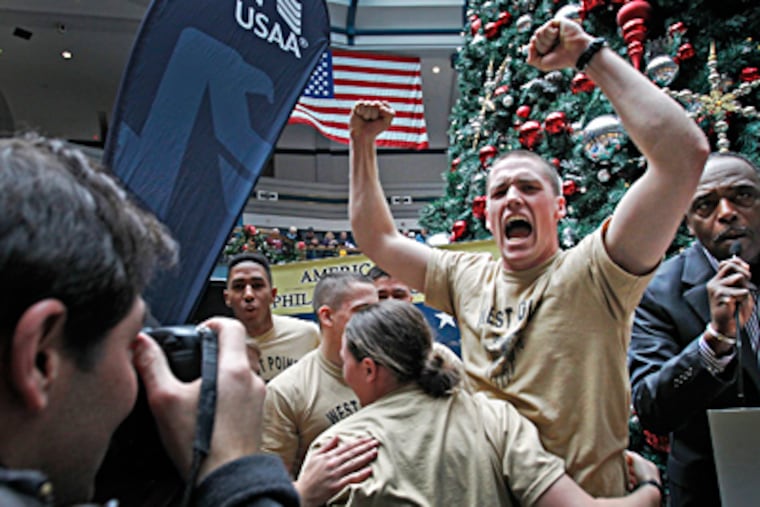For Army-Navy game seniors, doubts bow to duty
Fifty seniors will suit up for Saturday's Army-Navy game, and the realization has kicked in for all of them at one point over the last four years.

Fifty seniors will suit up for Saturday's Army-Navy game, and the realization has kicked in for all of them at one point over the last four years.
Did they make the right choice?
"It doesn't really hit you until you get here and you see your older buddies, the seniors you've played with, going to Afghanistan," said Navy's John Michael Nurthen, a senior linebacker from Phoenixville.
"That's when it starts to set in, and you think: 'Shoot, that's me in a year or two.' "
Indeed, once their education has concluded, these players face five years of service, and the chance is shockingly real of being sent into harm's way somewhere in a volatile world.
"It's natural to be a little scared of that," said Nurthen, a graduate of Great Valley High School. "But it's what you signed up for."
Army and Navy, which will meet for the 113th time Saturday, at Lincoln Financial Field, pursue players who usually aren't recruited by the top major-college programs but who are up to the academic challenges and show the discipline and work ethic needed to succeed in the military.
When this year's seniors - 22 for the Black Knights, 28 for the Midshipmen - entered the academies in 2008 or 2009, they did it knowing the United States was fully engaged in wars in Iraq and Afghanistan.
"I don't know if it was just ignorance or immaturity, but I didn't really put it in perspective," Nurthen said.
Still, some seniors said the experience and benefits the academies provide outweighed concerns about being involved in conflict.
Of course, much has changed since the current seniors entered the academies. The Iraq war is over, from an American perspective, and President Obama has said he is committed to withdrawing U.S. troops from Afghanistan by the end of 2014.
When these seniors signed on, the commitment seemed more daunting.
Army guard Frank Allen, a senior from Delanco, comes from a military family. His father, Paul Allen, is a retired Marine colonel, and his grandfather, Paul Allen Sr., retired from the Air Force as a lieutenant colonel.
He said he grew up thinking about war, particularly after the Sept. 11 attacks, but the economic benefits of West Point prevailed over any fears.
"Coming out of high school, I felt that if I wasn't going to make it somewhere in college football, I wasn't going to pay for college," said Allen, who starred at Holy Cross High in Delran. "When I was making my decision, there was a housing crisis, and the economy was going down. You weren't sure if there were going to be jobs.
"So going to West Point was a good career path. The idea of five years wasn't too big of a deal because I was going to have a job after college."
John Howell, a senior slotback from Navy who lives in Hatfield, said he was "skeptical" initially about whether he wanted to be saddled with a five-year commitment after graduation. The Lansdale Catholic graduate wound up choosing Navy for the employment opportunities but said he "did a 180" in time regarding the desire to serve his country. He will become a Marine Corps pilot after leaving Annapolis.
"I wouldn't say there's a fear of it," Howell, whose father is a retired Navy SEAL, said of possible combat duty. "You kind of put that fear aside. There are people on the ground that are going to be in it a lot worse than I am. I'll be trying to help them and do my part.
"So I wouldn't say there's fear, but definitely there's a responsibility. That's what we signed up to do."
That's not to say everyone who signs up for the four years of school and five years of service stays. Academy students are allowed to withdraw after two years.
West Catholic graduate Raymond Maples, a junior running back for Army, said he considered pulling out.
"Every West Pointer thinks about it," Maples said. "It's obviously something everybody goes through. They don't know if they're going to make it or what kind of officer they will be. But I committed, and I'm happy about the decision I made."
Maples said he really found himself as a squad leader last summer at Camp Buckner, where cadets undergo field training. Army coach Rich Ellerson said Maples experienced "an epiphany. . . . He has matured as a young man, a competitor, and also a leader. He's been just spectacular."
Allen, who will be entering the Finance Corps after graduation, said everyone at West Point "probably thinks about leaving during his sophomore year." He said he did as well but added, "It's not like I took myself seriously when I thought about it."
Nurthen is headed to California after graduation to train with the Civil Engineer Corps. He said he felt early in high school that Navy would be good for him because of his personality. And it has been, he said, regardless of what happens next.
"It's a great fit for me because of the structure and the discipline, and the opportunity that it had for me was an added bonus," Nurthen said. "Now it's a little bit surreal. It's crazy how time flies."
For live coverage of Saturday's Army-Navy game, including pregame festivities, visit www. philly.com/armynavyliveEndText
More Coverage
EndText